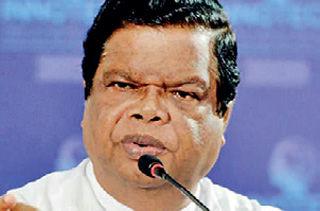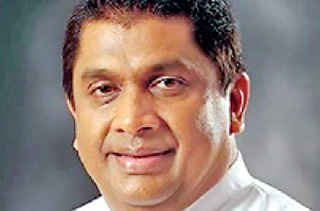Tuesday Feb 17, 2026
Tuesday Feb 17, 2026
Wednesday, 11 August 2021 02:09 - - {{hitsCtrl.values.hits}}

Finance Minister Basil Rajapaksa

Trade Minister Bandula Gunawardena

Cabinet Co-Spokesman Minister Keheliya Rambukwella

Consumer Protection State Minister Lasantha Alagiyawanna
By Charumini de Silva
The Government yesterday announced several tough and difficult measures aimed at keeping the cost of living under check from a sharper rise amidst mounting pressure.
A host of measures to deal with the shortage of milk powder and LPG caused by the Government›s reluctance to adjust prices upwards in line with global spikes were made by the Cabinet of Ministers at its meeting on Monday.
Cabinet Co-Spok-esman and Mass Media Minister Keheliya Rambukwella told journalists at the weekly post-Cabinet media briefing yesterday that the Government decided to abolish taxes amounting to Rs. 175 on milk powder to prevent an upward revision in prices, but importers and manufacturers are insisting on a hike as the tax cut only amounts to 40% of the current loss incurred.
The move comes after the Government in the previous week denied the severe scarcity of imported milk powder in the market.
“There is a scarcity of milk powder in the market with companies requesting to increase prices. As a solution, the Cabinet of Ministers decided to completely abolish the Rs. 175 import tax on milk powder,” Rambukwella told journalists yesterday.
Although the tax on the import of milk powder generates significant revenue for State coffers, he said the Cabinet decided to abolish the tax as a progressive step.
“Finance Minister Basil Rajapaksa has taken a strategic decision in controlling the current prices without passing on the burden to the general public, despite it being a costly affair for the Government,” he added.
Rambukwella also said that these were not popular decisions, but rather progressive and responsible decisions given the economic conditions due to the COVID-19 pandemic.
The Minister also added that the price controlling mechanism would have applied had there been normal economic conditions.
“However, if stockpiling is found and if things go out of hand, to mitigate the situation we will bring in price controlling mechanisms to normalise market conditions subject to the legal framework,” Rambukwella said.
Private sector sources said taxes only amount to 40% of the retail price and an upward price revision was imperative in view of rising costs in the global market.
The industry first proposed a price revision in March and renewed its appeal in June but the Government refused to give in. In June the private sector warned of an impending shortage.
With regard to the LPG crisis, the Government is seeking legal advice from the Attorney General to take action against the private LP gas companies that have limited their imports after not receiving permission to increase the prices.
“A crisis has emerged with a short supply of LP gas to the market,” Consumer Protection State Minister Lasantha Alagiyawanna told journalists yesterday in a separate briefing.
The market saw a shortage of LP gas, following public-listed LAUGFS Gas announced the temporary stop of its import and distribution as it could not bear the losses from selling at controlled prices set by the Consumer Affairs Authority (CAA).
Thereafter, State-owned Litro Gas last week said that they too will issue only 100,000 cylinders per day to the market, following massive demand as a result of panic buying.
The country’s daily need for domestic gas cylinders is 90,000-95,000, however, over the past couple of weeks, Litro gas alone has issued close to 500,000 cylinders to the market.
“We are in the process of seeking legal advice on the matter. At the same time, we will hold discussions with the two gas companies to reach an agreeable conclusion soon,” Cabinet Co-Spokesman Minister Keheliya Rambukwella said in response to a question posed at the post-Cabinet media briefing yesterday.
Despite the economic difficulties faced due to the adverse impact of COVID-19, he assured that the Government would take a decision to safeguard the consumer from any possible price burden, whilst ensuring uninterrupted supply of LP gas to the market.
The State-owned Litro Gas Ltd. annually incurs a loss of Rs. 1.3 billion as a result of maintaining LP gas at a concessionary price. The loss per 12.5 kg cylinder is Rs. 850.
Separately, the Cabinet of Ministers also approved an increase in the fines against traders selling essential consumer goods beyond the maximum retail price (MRP).
Previously the minimum fine was Rs. 2,500 but will be increased to Rs. 100,000 in a tough move to regulate the sale of essential consumer goods and to prevent the artificial price hike by traders from time to time.
The approval to amend the fifth sub-section of the 60th section in the Consumer Affairs Act No. 9 of 2003 was sought on 19 July and the Attorney General had approved the Bill prepared by the Legal Draftsman.
Trade Minister Bandula Gunawardena commended the swift action taken by the Attorney General Department and the Consumer Affairs Authority (CAA) to amend the necessary legal provisions to safeguard the consumers.
He also said an Extraordinary Gazette notification will be published in this regard today.
The Trade Minister said the Bill will help to maintain the rice price below Rs. 100 whilst also maintaining the promised paddy prices to the farmers without hindrance.
“We will not allow the vendors to strip the consumers like other times. The rule of law will be implied to all traders. We will also ensure the certified paddy prices for the farmers,” he added.
Gunawardena claimed that certain people involved in the paddy mafia said that they would not let the Government increase this fine under any circumstances.
Last week, the Government denied the scarcity of essential goods in the market, insisting that imports were being facilitated despite the challenging foreign reserves situation.
“There is no scarcity of essential goods,” Cabinet Co-Spokesman and Plantation Industries Minister Dr. Ramesh Pathirana said, responding to a question posed at the post-Cabinet meeting media briefing last week.
In May, Sri Lanka had spent $ 253.6 million on consumer goods including food and beverages, dairy, vegetables, sugar and $ 330 million on fuel. In the first five months of 2021, $ 1.3 billion was spent on consumer goods imports and $ 1.7 billion on fuel, according to the Central Bank.
Headline inflation, as measured by the year-on-year (Y-o-Y) change in the Colombo Consumer Price Index, increased to 5.7% in July 2021 from 5.2% in June 2021.
The Central Bank said this was driven by monthly increases in prices of items in the Non-food category. Subsequently, Food inflation (Y-o-Y) decreased to 11.0% in July 2021 from 11.3% in June 2021, while Non-food inflation (Y-o-Y) increased to 3.2% in July 2021 from 2.5% in June 2021.
The CCPI, measured on an annual average basis, increased marginally to 4.2% in July 2021 from 4.1% in June 2021.
The core inflation (Y-o-Y), which reflects the underlying inflation in the economy, increased to 3.7% in July 2021 from 3.2% in June 2021. Moreover, annual average core inflation increased marginally to 3.1% in July 2021 from 3.0% in June 2021.
Advocata’s Bath Curry Indicator (BCI), which tracks the monthly changes in the price of food, recorded a jump of 0.70% for the month of July 2021.
In comparison to the month of July 2020, the BCI has increased by 45% for 2021, which translates that an average family of four that spent Rs. 899.85 on this basket of goods for a week in July 2020 would pay Rs. 1,308.10 for the same amount of goods in a week in July 2021.